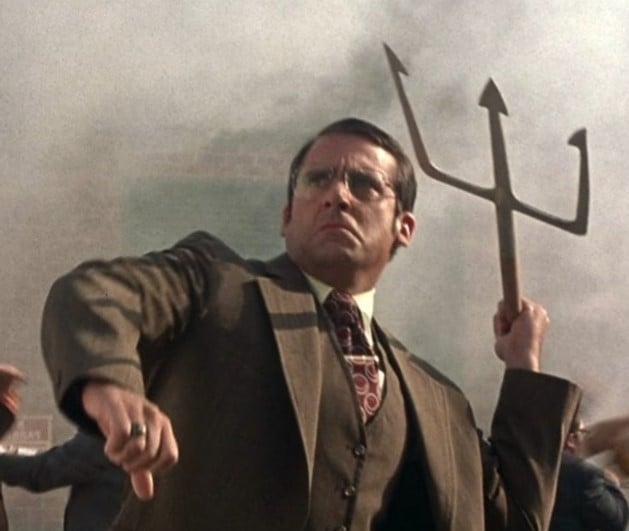Exposing children to social media.
Putting your kids on social media publicly.
The kids that grew up with it will probably see the harm caused and not want to pass that on.
Yea this. It’s the cigarettes of our generation. “I don’t know, everyone was doing it back then”, we’ll all say.
And our blind acceptance of it all, to the point of allowing it to replace journalism and politics, will be seen as dumb in the same way we now breath in some cigarette smoke and see it as obviously unhealthy.
I think the dumbing effect it’s having on us as a society might even stop us from ever having realizations like his ever again though
society https://youtu.be/rRYRPbGbbxA
Here is an alternative Piped link(s): https://piped.video/rRYRPbGbbxA
Piped is a privacy-respecting open-source alternative frontend to YouTube.
I’m open-source, check me out at GitHub.
I don’t know about that. Younger millenials that grew up with social media are having kids and I see them posting about it.
For better or worse, I think social media is here to stay in some form or another. Maybe theyll fight harder to put some limits on it but I’m skeptical
Even when the US was down to like 20% smokers, in some European countries it was in the high 40s. Social media will DEFINITELY stick around. The question is how it’s viewed.
I agree with you fundamentally. How do you feel about social media that is decentralized, open source, and non-corporate like Lemmy, Friendica, Pixelfed, et? I think these decentralized platforms are much less toxic because toxic people quickly get banned and shared with others. Furthermore, I think that with proper education of what social media is and what the positives and negatives are - including adverse consequencies - could be very beneficial. When social media is done in a positive way, it can be a great way to build friendships and exchange ideas and information. That much said the corporate social media is awful and in no way would I want to subject children to it as it could set them up for psychological trauma with real and lasting consequences to their mental health.
Would still not expose my kids. Anonymity brings out the worst in folks. And social media gets used for bullying no matter the platform.
As an adult, able to practice some opsec, and kcomfortable with their sense of self. Fine.
As kids, mine won’t have access. I have had family comment because we ask for our kids not be to put on Facebook. They understand a bit more now, 10 years later, but only to a point.
I can respect where you’re coming from, and largely, because I feel the same way. I am in no way qualified to give you any paternal advice because I don’t have children of my own. I can only speak to the mistakes my parents made on my brother and I which actually subjected us to ridicule and bullying from classmates. My parents carefully managed what my brother and I would be allowed and not allowed to watch on TV. One of the results of this was not knowing what The Simpsons was all about when the first episode aired. The fact that we had no idea what our peers were talking about left us in a bad way. Now granted, our parents never explained to us the reasons and benefits for doing what it was they were doing so it felt autocratic. If I had to guess, you are probably taking a very different path that helps your children to understand the reasoning why they would be better off, sans social media.
There is a point where you cant control kids, outside influences just become too much… My job isnt to shelter them at that point, but to teach them to navigate a world that doesnt care about them, while also teaching them to be confident in their choices and strong. You cant please everyone, but that doesnt mean you need to be an asshole or inconsiderate.
My older is approaching that. And my job will shift from one of protection to more advisory role with interventions only when absolutely necessary. It is what it is. Maybe my kids get bullied, actually its probable. Many bullies take out their frustration with homelife on others and my kids probably wont have too much of that to inflict on others. Ive seen it first hand. My parents were abusive by modern standards. I wasnt a bully myself (that I recall), but i didnt stand in the way of others that may have been. I was bullied to, probably not as much as others because I’m a bigger guy. But definitely because of my race.
What matters is how you deal with it and carry it. That said, moderation in all things will help. Mine wont be the first to have a cell phone, but probably not the last either. I dont plan to have any parental controls on there, they just teach deception and break trust. So whatever social media the kids are into will probably have my kids on it. The job isnt going to be to protect them from that, but to teach them to manage it and deal with it responsibly and keep their guard up.
Also, has anyone tried to tell a kid not to do something? It doesn’t work lol. What kinda childhood did y’all have? Cause I very distinctly remember how kids were constantly getting around my school’s filters. I remember how many people got stuff like alcohol and tobacco from their friends. Every kid figured out how to watch porn from an early age, too, despite the fact that all these arguments against social media apply to porn (and arguably porn is worse for people simply because of the unrealistic and unhealthy expectations it sets).
I’m not saying don’t have rules just because your kids will break them. But accessing social media is such a hilariously easy rule to break. And kids won’t respect you if they disagree strongly with your rules. Setting a “no alcohol” rule is socially acceptable, but a “no social media” rule is just gonna breed rebellion. Unlike alcohol, they’re gonna be exposed to it every day through their friends. Their friends will send them links in chats. They will find ways around your rules and they’ll resent you for them.
At best, you can just delay how long before kids get exposed to social media and how long before they figure out how to get around your rules. But the last one won’t take long. My parents had stupid rules surrounding the internet and I learned fast how to get around them.
The much better approach is to talk to your kids. Teach them the dangers. Build a good rapport with them so that they trust you and will talk to you if they’re being bullied or the likes. If you just ban something, your kids are gonna use it anyway but without any knowledge of the dangers and they will not come to you if something goes wrong. This is the exact same issue that comes up with alcohol and sex. It’s not a new problem. Just a new thing being banned by a new generation.
I wasn’t allowed to watch the Simpsons or Blossom when growing up either because they were too rude and adult respectively. I definitely felt left out and kids made fun, but I get it now. Kids will (and DID!) make fun of anything, but I get the idea of sheltering kids. People try to do it today with gun violence. Maybe I feel differently because my parents explained why they were banning them, but “it’s trashy” was at least a justification, even if I didn’t agree with it.
This isn’t social media. I don’t know you and I can’t pretend to know you. This is a discussion board/ bulletin board/ forum dressed in new clothes, and I’m cool with that.
Hopefully for profit health care, but I’m not holding my breath.
Definitely don’t hold your breath.
If you pass out and hit your head, do you know how much that would cost to go to urgent care?
So how to we take down the corporate overlords?
We stop getting sock/hurt/giving birth.
Meat eating is a possibility. I don’t see it being universal, but veganism is on the ride and it makes sense to a lot of people.
It’s just not sustainable. Lab-grown meat is here, it just needs to get to scale, get a bit cheaper and boom. Farming and killing animals for food will be obsolete.
Farming as a whole will still not disappear at all, animal agriculture will change, but will also not disappear.
That is, of course, providing it’s sustainable, which at the moment it isn’t.
https://www.ucdavis.edu/food/news/lab-grown-meat-carbon-footprint-worse-beef
This is the first thing that came to my mind, too. I’m a omnivore myself and admittedly love my meat, but it’s very bad for the environment and I can’t deny the ethical concerns are there. At the very least, I can see low key vegetarianism being the norm in 20 years, where the norm would simply be to not have meat products, and meat might instead be a more niche diet or simply not the norm.
If lab grown meat manages to become scalable enough, I can also see that nearly completely replacing “real” meat. Once it’s at least as affordable, I think “real” meat’s days would be numbered. It’d become a thing only for purists/elitists/exotic diners. I would even expect that lab grown meat would eventually become cheaper than “real” meat simply because it would be far faster to grow and take fewer resources than to grow an entire animal to adulthood.
As an aside, would labe grown meat be considered vegan? I think it would be since no animal is harmed in the making of it. I imagine many existing vegans wouldn’t want to eat something that tastes like meat, but it would be the thing that converts practically everyone else. I sure don’t see why I’d ever want to eat “real” meat again if I could get a comparable lab grown meat that doesn’t harm animals and is better for the environment. That’s just a win win.
Lab grown meat is grown from cell cultures that were taken from animals that were not capable of consenting to donate these cells.
Hardcore vegans will likely still despise it, but for a lot of less hardcore vegan people it might become an option, especially if marketing hides the origin.
IMHO it’s more important that the carbon footprint of growing cell cultures is bigger than that of growing animals. Unless this changes, lab grown meat is not an option to fight global warming.
I think in the grand scheme of things, if you have to ask if something is vegan, it’s probably not worth worrying about too much. Perfect not being the enemy of good and all that.
This definitely. For ethical or cost-effective reasons. I think price is going to be the main incentive. If its a dollar less a pound for lab grown hamburger and options at fast food outlets - we’ll definitely be there. Real meat will become the new “fancy food” - wasteful and indulgent spending.
When the quality and cost of labgrown meat matches the real thing - we’ll see the tables turn. Especially if they’re able to produce various *cuts^ and styles.
Even beyond that, I wouldn’t underestimate the power of cultural change. From what I can tell, drugs, sex and clearly defined gender identities are all on the decline in the younger generations in the west. I’m not sure there’s any good or clear external force pushing this. I think it’s just change. When it comes to eating meat, it’s pretty easy to start thinking through why you don’t need to do it as much as the typical western diet does, which feels pretty ripe for some form of merely cultural change.
My theory is that drugs, excessive sex and to some extent petty crime are partly a result of boredom for teenagers.
Teenagers today have less reasons to be bored than a generation or two ago. Instead, they’re getting dopamine fixes from social media and gaming.
I’m not sure if that’s related to dieting.
If done right, the cultural climate to change from eating living things to lab grown meat will be as simple as ordering the same dishes at restaurants with substitute ingredients that nobody notices.
And cost. It’s hard to justify a diet change otherwise.
Americans went from eating sheep to cows in the 1800s because cows were cheaper per pound, more resilient to diseases and easier to maintain.
Veganism is popular because it’s still a cost effective diet. Mass farming is compatible with it.
I can easily see “Pepsi Challenge” style ad campaigns where people blindly guess which bite was the real meat - and which one they prefer.
Though, I also see a backlash. In a way that the proliferation of hybrid and electric vehicles created the anti-environmental practice of “coal rolling”, whereas asshats modify their truck engines to produce more pollutants to own the libs.
Teenagers today have less reasons to be bored than a generation or two ago. Instead, they’re getting dopamine fixes from social media and gaming.
I think similarly and have said so before.
Traditionally grown meat will go the way of vinyl. Slowly fall out of popularity, then eventually become a status good, popular among aficionados, ignoring its actual inferiority in blind tastings. Calling it now, in 25 years, most US beef will be Kobe style, “we brushed our cows’ hair and sang it lullabies” and differentiated by marketing.
My money is on this one. Once we find a more sustainable way to get meat, and that scales to the globe, whatever that method is, I think the idea of keeping animals only to kill then will quickly be viewed as abhorrent.
Likely won’t be as quick as within 20 years, however. Lots of companies currently making a fortune selling meat who will stand in the way of that.
Just spitballing, but potentially:
- undeclared AI usage for photos, video, code, etc
- driving old beater cars or even nicer old ones like corvettes
- Being outside during the peak of the day’s heat
undeclared AI usage for photos, video, code, etc
I think this is the one. It’s this generation’s Napster, but the difference is it’s not Britney Spears and Metallica getting robbed. It’s every artist who ever posted their work to the Internet, and that’s a huge, huge deal.
Most modern music is a collection of sounds and samples made by other people put together to create a new track. Then they sing over it using autotune. That has been accepted and normalized by the masses.
I’d sooner drive an old beater over even an EV with fifteen million computers that I can’t hope to service myself tbh, and motherfuck getting gouged by the Firestone or god forbid, manufacturer mechanic shops for them to do it. Until coast to coast, America’s cities are walkable, you won’t catch me in a computer’d out car.
Gotta agree with that sentiment. Got an old single cylinder carb-fed bike that I’m not looking to trade for a beep-booper any time soon
I agree with the first two, but the third one will happen only when most things catch on fire during the peak hot times. Workers in Texas don’t get water breaks in the current heat wave.
Protesting.
The future looks scary to me.
Hopefully that goes the other way and it is more normal to do so
We could learn a lot from the French.
Stealing water from neighboring clans. Driving cars without spikes.
Not going to Thunderdome with your friends.
Not being 100% available 24/7/365 will become even less acceptable than its already become.
Daily commuting can also go.
I’d guess it’d be the opposite for some people who get tired of having to be constantly available.
Yeah I feel like that pendulum is swinging back already.
Yes, there is already laws in Europe to protect the “right to disconnect”.
You have the right to not be reachable outside of work hours.
Yeah. There will always be those who push harder and harder for more and more intrusive communication at all hours, but as the pendulum swings back the other way, it will be more and more acceptable to walk away from such jobs and seek out places that show more respect for private time whenever you’re off the clock.
Publicly releasing a crime suspect’s name before conviction. Can’t believe that’s legal, may as well call them guilty until proven innocent.
I read somewhere that doing that makes it harder for the police to just “disappear” you
Hopefully in 20 years we won’t have to worry about people being disappeared by the police…
Single use plastic
Hopefully
It really can’t happen fast enough
I think basically every single top level comment has zero understanding of what a short time 20 years actually is.
I also expect almost everything that is acceptable today will also still be in 20 years, including nearly every example suggested in this discussion.
The world simply does not change that fast as a general rule.
Completely disagree, but if you haven’t been around for at least a couple of sets of twenty years I can see why you would think this.
Someone else gave a great set of things that were different, but really, twenty years ago was almost completely different in nearly every dimension of life I can remember.
In 2003 not only was gay marriage not legal, gay sex and relationships were illegal where I live, and was punishable by prison time.
In 2003 most of the country wasn’t online, pagers were more common than cell phones, and 3DFX VooDoo graphics cards were still a thing.
In 2003 I used to smoke inside my community college’s cafeteria, where people ate because it was the designated smoking area.
In 2003 minimum wage was $5.15 nationwide, and gas was just a little over a dollar.
In 2003 people didn’t use laptops in school and electronics were confiscated on site, sometimes teachers would ‘lose’ them and you never got it back, and somehow that was an expected outcome - I lost a laser pointer that way.
In 2003 casual homophobia was mainstream, all your friends, and probably you would be making gay jokes, and transphobia was not a concept. I thought transgender people were the same thing as intersex, I didn’t know gender transition was possible.
American society was post 9/11 and highly patriotic, even liberal people were unusually patriotic, and politics were probably the most ‘neutral’ that I’ve ever seen, it was nothing like they are now, but in general things trended towards cultural conservatism.
I remember being an outcast because I didn’t believe in God, and people would casually tell me I was going to go to Hell.
Nah, 20 years is an entirely different cultural paradigm.
23 years ago offices buildings were not locked. No doors were locked. Zero. You didn’t need a badge to be in the building. Now in most places you swipe through every single door and you need a badge on a lanyard.
Voodoo cards were largely irrelevant to new buyers by 2001. The Vodoo 5 line was launched in 2000 and wasn’t a terrible value, but then Nvidia launched the GeForce 3 in early 2001 and ate their lunch. 3dfx went defunct in 2002 and their assets were bought up by Nvidia.
But your point is completely valid, culture moves slow even when business and technology don’t.
I really do mean culture independent of technology though, the entire range of acceptable opinions now versus then is completely unrecognizable, and in many ways my entire thought process and range of ideas are foreign to then as well.
I don’t know how old you are but I lived through a completely different experience than you…
I’d been selling and repairing computers for 6+ years by 2003 and had been in the workforce many years before that. I can assure you people were definitely using laptops in schools (as I sold them to them)… Maybe not as ubiquitously as they do now but it was already quite common.
I think we’ll just have to agree to disagree on how much things have changed since then … Now, if you want to go back 30 or 40 years then I can definitely agree we’ve seen some significant changes.
Hell, the first time I flew out of the country I didn’t even need photo ID much less a passport.
Most schools didn’t have Wifi in 2003, so it’s not clear what “using laptops” would’ve been. There were computer labs, sure (mostly desktops).
Colleges had ethernet jacks in every desk in improved/modern classrooms (and nothing outside of those). The use of laptops in college was already common, in school - not yet.
Cell phones were already common, but smartphones - not at all. Palm phones were the epitome of “smart phone” - and getting data on/off them was a pain. Many plans still didn’t include unlimited calling. Verizon was innovative with offering unlimited calls to a preselect group of numbers.
Not sure what your point is about having sold and repaired computers for 6+ years before 2003. Sure, computers had been sold for far longer than that. But we are talking about what was (and wasn’t) commonplace.
I’m not sure what point you’re trying to make.
WiFi is in no way necessary to take notes, write papers, etcetera.
College is certainly included in the definition of “school” so that seems a silly separation to try and make.
Cell phones and smart phones in particular are irrelevant to anything I said.
Do you have a point or are you just trying to disagree with me?
My point is that my experience in my life, to now, across two decades, was drastically different. People still didn’t bring a laptop to the community college I went to that year either, I had never seen or heard of it as a practice until later.
I returned back to school about five years later and laptops in classes was common.
We somehow seem to have had drastically different experiences she perspectives from a broadly large geographic region.
For additional perspective my typing class in 1999 used an actual typewriter, not a computer, so socioeconomic factors of my own high school experience and the area I grew up may have actually been that different and potentially atypical to even surrounding areas, it’s hard to tell.
That could certainly explain some things seemingly drastically different over that 20 year period for you I suppose then.
I grew up in one of the wealthiest communities on earth, i am likely older than you based on what you have said here, and I cannot see how you could be in your forties and not see that things can change very quickly. The other guy’s relative lower income isn’t the cause of our shared beliefs.
In case it still doesn’t occur to you, I pointed out that I’d been in the computer business for a number of years already by then to illustrate that I’d already been selling laptops for years to people who intended to use them in school prior to 2003.
Colleges maybe but public high schools it was not common at all.
Bro out of that entire list the only one you could contradict was computers, which I definitely don’t remember being widespread 20 years ago, and they were certainly nothing like the computers of today in terms of experience. What about, y’know, the whole gay marriage thing? Seems like a pretty dramatic change you’ve just brushed over.
I was in high school in the nineties and no one had a laptop in class, then when I went into community college, things like online classes were a novelty, with a handful of offerings and a large computer lab because most people didn’t have Internet access at home, so you would do your online work there, or at home and bring it to school to upload on a floppy disk.
This was my regional reality, southeast US, but was very much the experience of tens of thousands up until the period of time, 2003, that you’re referring to.
Up until then it was only rich people that had Internet access at home, and most of the people I knew would often lose their lights and phones from their parents not being able to pay for utilities.
Some of my experience is skewed towards poverty because that was the social circle I had, but I still never had the impression that the masses actually had Internet or even laptops at home. Most people did have an offline computer, usually five to eight years old though.
Dude… I wasn’t rich and it most certainly wasn’t “only rich people” that had internet at home.
Hell, I personally had both cable and DSL in my house from 2000-2003 so my wife downloading wouldn’t cause latency issues with my gaming.
I also lived in the southeastern US at the time.
In 2005 at a top 50 liberal arts school, I was the only person in almost every class I was in using a laptop to take notes. Huge 200 person lectures there were definitely a few, and in later years I still remember being crazy jealous of a woman who had a laptop with a stylus for drawing econ graphs - one set of classes I wrote manually in - but she was a rarity. My notes were always highly sought after for sharing because I’d have 4 pages typed instead of 2 scrawled and not keeping up.
I think basically every single top level comment has zero understanding of what a short time 20 years actually is.
I also expect almost everything that is acceptable today will also still be in 20 years, including nearly every example suggested in this discussion.
The world simply does not change that fast as a general rule.
In 2003, you could still smoke indoors in many states/countries who have since made it illegal.
In 2003, cannabis and homosexuality was illegal in many more countries than it is now.
In 2003, there were many more TV shows/movies with ingrained sexism than there are now.
In 2003, having hundreds of “online friends” meant you were a social recluse who only spent time on IRC/MSN messenger.
In 2003, if you met a significant other online, you came up with an elaborate story to hide it.
In 2003, most people had a paper map of the streets folded up in their glove compartment.
In 2003, people still remembered phone numbers, phones all had removable batteries, every phone company had a different OS/charging cable, and no phone had a screen >6 inches big.
(cheating a little here, but I would be remiss not to mention this) In 2000, it wasn’t illegal to bring a full water bottle into a plane.
Thanks, but I remember things from 20 years ago and this is an exaggeration in many ways… Or perhaps I should say multiple exaggerations.
Things were far more noticeably different 40+ years ago (which I also remember).
Oh, and for what it’s worth, it’s still not illegal to bring a full water bottle on a plane. You just can’t bring one through security so you have to buy it in the airport after the checkpoints.
I remember 20 years ago. I remember 40 years ago. It changes pretty fucking fast and it gets faster every year.
I don’t have much to say except this take is flat out incorrect
Well then, we have a mutual perception of each other’s thoughts on the topic it seems.
I agree, but we should also remember that time is relative. In under 100 years we went from “holy shit our balsa wood plane flew 250 feet” to “one small step for man”.
Completely disagree, but if you haven’t been around for at least a couple of sets of twenty years I can see why you would think this.
Someone else gave a great set of things that were different, but really, twenty years ago was almost completely different in nearly every dimension of life I can remember.
In 2003 not only was gay marriage not legal, gay sex and relationships were illegal where I live, and was punishable by prison time.
In 2003 most of the country wasn’t online, pagers were more common than cell phones, and 3DFX VooDoo graphics cards were still a thing.
In 2003 I used to smoke inside my community college’s cafeteria, where people ate because it was the designated smoking area.
In 2003 minimum wage was $5.15 nationwide, and gas was just a little over a dollar.
In 2003 people didn’t use laptops in school and electronics were confiscated on site, sometimes teachers would ‘lose’ them and you never got it back, and somehow that was an expected outcome - I lost a laser pointer that way.
In 2003 casual homophobia was mainstream, all your friends, and probably you would be making gay jokes, and transphobia was not a concept. I thought transgender people were the same thing as intersex, I didn’t know gender transition was possible.
American society was post 9/11 and highly patriotic, even liberal people were unusually patriotic, and politics were probably the most ‘neutral’ that I’ve ever seen, it was nothing like they are now, but in general things trended towards cultural conservatism.
I remember being an outcast because I didn’t believe in God, and people would casually tell me I was going to go to Hell.
Nah, 20 years is an entirely different cultural paradigm.
Yes… The 100 year scale has been far more drastic and interesting a measure of change, particularly in the past century and a half or so.
Twenty years ago almost no developed nation had gay marriage and no one would believe that a black man would be POTUS (Obama’s keynote at the DNC was 2004 and he was not a national figure in 2003).
A lot can happen in twenty years.
20 years is a lot of time for change, looking at the speed of how the world is changing now, and looks like it will be faster
“He’s so gay” was far less frowned upon in 2003. Shit changes.
I think that you are the one who has zero understanding of how fast culture can change. There are a LOT of things that were considered acceptable 20 years ago but aren’t today.
Like what? Keep in mind that’s 2003
Well being gay isn’t illegal in a bunch of countries, for one. Kind of a big cultural change. Can’t smoke indoors like in planes or in restaurants, those are just a couple of the most obvious off the top of my head, but they’re far from the only examples.
watch Chappelle show
a lot of the shit in here is just ignorant. I believe a lot will change, but not the shit people are posting. religion?? come on
I know it’s just conventional wisdom, but among those who look back and forward and think about this stuff, it’s been common conventional wisdom for a century that 20 years is an exceedingly long time for change.
I like Bill Gates’ quote the best, “People often overestimate what will happen in the next two years and underestimate what will happen in ten.”
SUVs.
There really is no need to haul 3 tons of steel around with you, and as more and more extreme weather events happen you’ll have more and more people looking around for others to blame, and oversized cars which are clearly unnecessary for work (especially the ones with Internal Combustion Engines) make for big very visible targets, with the added factor that in some places they’re seen as conspicuous displays of wealth (and flaunting wealth will be another thing that’s likely to become frowned upon within the next 2 decades).
Not saying that SUVs are all to blame or even that the rich ride them (in my experience they’re more the cars of a certain middle class), but they’re in that spot of being abundant enough and yet only a minority of cars, easy to spot, often imposing in a showoffish way and logically more poluting that smaller cars, all this right when the impact of Global Warming is really and properly starting to be felt, something which at the current rate will get much worse in 2 decades.
Also, unlike big oil companies SUV owners don’t have PR departments with hundreds of millions of dollars of budget to sway the press and swindle the useful idiots.
I hope so. I was about to join the smaller end of the SUV crowd, but then I test drove a van. We have a van now. Even more space, better efficiency, and less expensive to buy. Just had to let our pride take a hit and drive the uncool-parents-mobile.
yeah right americans will totally overcome car-based infrastructure brainwashing and learn to hate the thing that they base their identity on totally
just like the confederate flag, totally died out when racism became uncool. and I think you’re especially accurate that a widescale global disaster will definitely change people’s thinking, that always happens and never redouble their biases with insane conspiracy theories driven by billionaire backed media campaigns
You’re disputing something I didn’t actually state.
I very explicitly went for SUVs because I actually believe the same as you when it comes to cars in general: 20 years is far too little time for people to completelly turn away from the, especially in car-loving countries with horrible public infrastructure for anything else, like the US.
Sacrificing a minority segment of the car market to appease the masses is not all that hard in 2 decades, whilst completelly changing the transportation infrastructure is damn near impossible.
This thread title is unfortunately about what “you think will” not “you hope and wish and pray will”, so super hard disagree. Electric cars are actually going bigger to account for huge batteries, and heavier because of them. Given that’s the upswing I find it hard to predict a sudden shift to smaller cars.
The only way it happens (and 20 years is a very long time, so it’s possible) is if cars become so expensive and mostly subscription model based like everything else, that car ownership goes down. If driverless electric cars become fleet vehicles in cities, you’d definitely see smaller cars becoming more common to have more on the road and privately replace public infrastructure because we can’t invest in that in the USA. So like Uber just illegally ran taxi services in many jurisdictions until it became too popular to fail, expect the same thing from driverless car fleets, a couple of which will get bought by Uber or Lyft. Young people are driving WAY less, so if they prefer to hail a direct driverless taxi to their destination and not pay to own a car, then the bulk of vehicles on the road could downsize. Private passenger cars though, would start being used for more long haul driving instead of the 99% short trips they’re currently used in, so I don’t see any downward size pressure on those.
Well, there have been a number of announcements of higher density energy storage technologies and that’s the direction things have been moving towards already with electric cars (in less than a decade ranges doubled with similarly sized cars), so I don’t think there is at all a trend for larger vehicles in that segment due to such pressures.
From what I read (which was not specifically for electric cars) is that SUVs are simply more profitable for manufacturers, hence their investment in designing and heavilly promoting them.
Because of those battery changes and demands for range, electric vehicle are way heavier than they used to be. https://www.iihs.org/news/detail/as-heavy-evs-proliferate-their-weight-may-be-a-drag-on-safety
They also follow the same growth in size as all vehicles, due mostly to consumer demand: https://www.fastcompany.com/90793619/evs-keep-getting-bigger-and-that-could-steer-the-u-s-down-a-dangerous-road
I don’t know. You don’t see many electric stationwagons around and people will want big boots after fossil cars are history. I really really hope you’re right though.
We bought a crossover earlier this year and love it, but I would have preferred to get a station wagon if they still existed. My parents had a Camry station wagon when I was a teenager and that thing was amazing.
There is also the shitty situation where because everything on US roads right now are big it actually makes smaller cars less safe in collisions due to relative mass with a likely other party. Also being at eye level with headlights kind of sucks.
SUVs are better than pickup trucks.
Current giganto tax-loophole pickups, sure. I drive a 97 standard bed, mostly for hauling (not a daily). It’s a great vehicle for the job. There’s probably a couple of safety features I wish it had but “be bigger than any potential collision target” isn’t one of them.
My concern is the MPG
Most pickups are not work trucks.
Costco trips are the hardest work they do.
My last SUV had the same engine as their smallest pickup truck.
And i bet the SUV got better mpg because of areodynamics.
Not by much, it was a beast. Got around 18 mpg, the equivalent truck gets about 16
Daily use of fossil cars and motorcycles.
Bringing your religion into other people’s business.
Depending on how lab meats come along, meat from slaughtering animals.
Idk man, I think motorcycles will become more and more popular, if there is more environment friendly people in the future they will probably switch to motorcycles and scooters. they are cheaper than a car (especially a used electric car, where the battery will potentially need to be replaced), their fuel efficiency is great, and are smaller than cars, which fit the urbanization trend of being more compact.
ICE motorcycles are loud and their emissions are difficult to filter properly due to size and weight economy. This makes them a much bigger nuisance than electric equivalents, and I think attitudes will shift to reflect this.
Working in the fossil fuel industry.
excessive alcohol consumption. I’m not saying I think there will be prohibition, but maybe it won’t be so normal to get almost blackout drunk, or everyone drinking at parties to be the norm.
I think the increase in really good tasting non alcoholic beer and spirits is telling.
I quit drinking last September and it was the best thing for my mental and physical health I ever did. Lemmy.world/c/stopdrinking has so many people who quit drinking for reasons other than hitting rock bottom.
I would say also the rise of really good alcoholic drinks too. Less mindless drinking, less alcoholism. I agree with this answer, the trend is already started. But think people will always want to get high in some way, do not think total sobriety is likely.
It’s one small thing to be thankful for. At the same time that I started losing my tolerance and drinking went from “yea!” to straight “blech”, sober curious became more of a trend. Any decent bar/restaurant will have a (good!) mocktail or two, and non-alcoholic beer really has lagers and IPAs figured out.
And I don’t feel like there’s any social pressure or scrutiny over what I’m (not) drinking.
People who care that you’re a non drinker are people with problems that you generally dont want to be a part of.
There’s a spectrum between people actually having a problem with you not drinking, and the general social pressure one experiences when out at a bar.
I can see this happening - maybe once marijuana or other recreational drugs become state or federally legalized.
How much sedentary time we spend in front of screens. We already know it is ruining our eyes and our sleep cycles.
I think it depends more on what you’re doing on those screens. I regularly download books from my local library to read on my phone. People used to read paper books, newspapers, and magazines all the time. Same shit, different means of consumption.
I don’t think we know it’s ruining our eyes, and screen usage probably doesn’t affect circadian rhythms unless it’s near bed time. But we do know sitting around all day increases your mortality quite a bit.
Also, blue light filter glasses are a total scam.
Screen time is definitely having a measureable impact on our ocular health
Over time, staring too long at screens can change the structure of the eyeball and lead to atrophy of the glands that keep it moist. Research is now pointing to excessive screen time for the rise in eye disorders, such as dry eye and myopia, which are becoming more common and affect more young people.
[…]
While myopia or nearsightedness has a genetic component, it has been shown to progress faster in people who overuse screens. Human eyes can also become chronically dry if the meibomian glands — a sebaceous gland that helps create protective tear film — become obstructed or atrophy. Meibomian glands secrete meibum, which is a specialized substance containing lipids that protects the eye surface.
It’s different than the watery tears that flush the eye. Without a healthy tear film, eyes become dry, sensitive to light and irritated. Research has linked staring at digital devices for long periods without proper blinking to degraded gland function, even in some children.
I stand corrected on screens not being bad for eye health, although I would still argue “ruining our eyes” is a bit of an exaggeration.



























